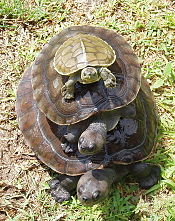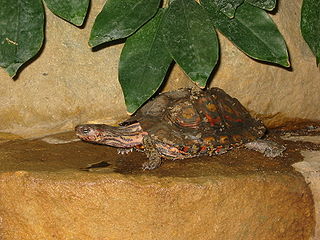
The Geoemydidae are one of the largest and most diverse families in the order Testudines (turtles), with about 70 species. The family includes the Eurasian pond and river turtles and Neotropical wood turtles.

The Amboina box turtle or Southeast Asian box turtle is a species of Asian box turtle.

Oldham's leaf turtle is a species of turtle in the family Geoemydidae.

The golden coin turtle or Chinese three-striped box turtle is a species of turtle endemic to southern China.

Asian box turtles are turtles of the genus Cuora in the family Geoemydidae. About 12 extant species are recognized. The keeled box turtle is often included in this genus, or separated in the monotypic genus Pyxidea. Genus Cuora is distributed from China to Indonesia and the Philippines, throughout mainland Southeast Asia, and into northern India and Bhutan.
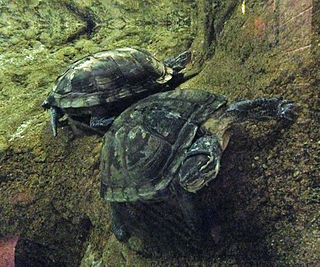
The Vietnamese pond turtle or Annam leaf turtle is a species of turtle in the family Geoemydidae.

The Caspian turtle or striped-neck terrapin is a species of turtle in the family Geoemydidae (=Bataguridae), living in the eastern Mediterranean region from southwestern former USSR and central Iran to Saudi Arabia, Bahrain, Israel, and Lebanon, northward through Turkey to Bulgaria, and through Cyprus, Crete, and the Ionian Peninsula to former Yugoslavia.

The four-eyed turtle is a reptile of the order Testudines. Its name refers to two bright yellow or green spots that occur on the back of its head that can look like another pair of eyes.

Mauremys reevesii, commonly known as the Chinese pond turtle, the Chinese three-keeled pond turtle, or Reeves' turtle, is a species of turtle in the family Geoemydidae, a family which was formerly called Bataguridae. The species is endemic to Asia.
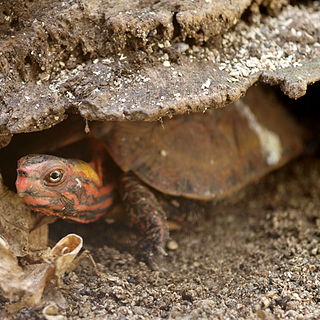
The Ryukyu black-breasted leaf turtle or Ryukyu leaf turtle, Geoemyda japonica, is a species of turtles in the family Geoemydidae endemic to the Ryukyu Islands in Japan. In 1975, the species was designated a National Natural Monument of Japan. It grows to about 5–6 inches long. In captivity, it feeds on worms, snails, insects, and fruit. Due to its rarity and very attractive appearance, this species is highly coveted by turtle collectors worldwide.
The Fujian pond turtle is a possibly also naturally occurring intergeneric hybrid turtle in the family Geoemydidae produced in larger numbers by Chinese turtle farms as a "copy" of the golden coin turtle Cuora trifasciata. It appears to occur in China and Vietnam. Before its actual origin became known, it was listed as data deficient in the IUCN Red List.

Mauremys is a genus of turtles in the family Geoemydidae.

The Japanese pond turtle is a species of turtle in the family Geoemydidae endemic to Japan. Its Japanese name is nihon ishigame, Japanese stone turtle. Its population has decreased somewhat due to habitat loss, but it is not yet considered a threatened species.
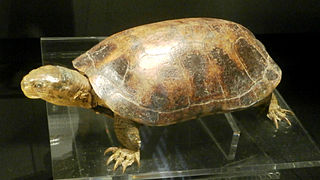
The yellow pond turtle, is a medium-sized, semi-aquatic turtle in the family Geoemydidae. This species has a characteristic broad yellow stripe extending behind the eye and down the neck; the carapace ranges in color from grayish brown to brown and the plastron is yellow or orange with black blotches along the outer edges. It is found in East Asia, ranging from central Vietnam and Laos, north through the coastal provinces of south and central China. Additional insular populations are found in Taiwan, Hainan and the Ryukyu Islands. The Japanese populations are believed to have been introduced as a result of imports from Taiwan.
"Mauremys" glyphistoma is an hybrid turtle in the family Geoemydidae. Originally described as a new species supposedly endemic to Guangxi/China; it was classified as Data Deficient in the IUCN Red List.
Philippen's striped turtle, "Mauremys" philippeni, has recently shown to be an intergeneric hybrid between a male Mauremys sinensis and a female Cuora trifasciata.

The Chinese stripe-necked turtle or golden thread turtle, is a species of turtle in the family Geoemydidae.
The Chinese false-eyed turtle is a hybrid species of turtle in the family Geoemydidae. It is a hybrid between a male golden coin turtle and a female four-eyed turtle. While formerly considered to be a wild type species believed to be originally from Hainan, it is now known only from pet trade type specimens.
Cuora serrata, originally described as Cuora galbinifrons serrata and later considered a distinct species, are hybrid turtles as shown by genetic studies. These hybrids are bred in the wild and were documented for the first time in the wild in 2005, but not in captivity as "novelty" pets as suggested by James Parham and Bryan Stuart, between the keeled box turtle and taxa of the Indochinese box turtle complex. Unnamed hybrids of several other Cuora taxa are also known, as are intergeneric hybrids like Mauremys iversoni, a hybrid between Cuora trifasciata and Mauremys mutica which are intentionally produced in Chinese turtle farms.

Turtle farming is the practice of raising turtles and tortoises of various species commercially. Raised animals are sold for use as gourmet food, traditional medicine ingredients, or as pets. Some farms also sell young animals to other farms, either as breeding stock, or more commonly to be raised there to a larger size for subsequent resale.















